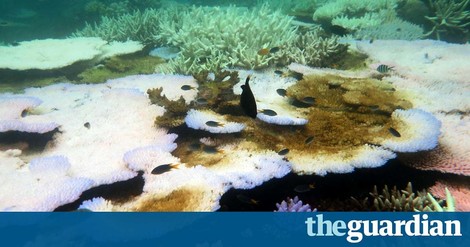Your podcast discovery platform
Curious minds select the most fascinating podcasts from around the world. Discover hand-piqd audio recommendations on your favorite topics.

piqer for: Climate and Environment Global finds
Andrea is a writer and researcher based out of Chicago. Andrea has a Bachelor's degree in environmental science from The Ohio State University and a Master's in Environmental Planning and Management at National Taiwan University, where she specialized in climate adaptation and urbanization. She writes for TaiwaneseAmerican.org, and sends out a biweekly newsletter which includes articles on politics, environment, identity, and intersections of race, class, and gender (http://eepurl.com/bPv-F5).
Great Barrier Reef At 'Terminal Stage': Scientists Despair At Latest Coral Bleaching Data
Add the Great Barrier Reef to the list of world wonders that may not survive the next decade. According to the latest available data, two-thirds of the reef has suffered from severe bleaching, following a similar event last year. Bleaching is the process where corals expel or lose the algae from their tissues and turn white. This process can be caused by a number of factors that stress corals, such as pollution and increased ocean temperatures. It can be reversed, but it takes time. Time that scientists say we don't have.
“Last year was bad enough, this year is a disaster year,” water quality expert, Jon Brodie, tells the Guardian in this article. “The federal government is doing nothing really, and the current programs, the water quality management is having very limited success. It’s unsuccessful.” From controlling fishing, agricultural or industrial runoff, and climate mitigation, it seems that experts believe the Australian government has done too little to protect the Great Barrier Reef and the immense tourist industry it feeds.
Without a committed, concerted effort to fight invasive species, significantly reduce pollution, and reverse the release of carbon into the atmosphere, the Great Barrier Reef may fall to climate change and a host of other human impacts. “You’ve got to be optimistic, I think we have to be. But every moment we waste, and every dollar we waste, isn’t helping the issue. We’ve been denying it for so long, and now we’re starting to accept it. But we’re spending insufficient amounts addressing the problem.” Can we, as a society, invest enough to save these things worth saving? Are we willing to?
